Life in Scotland
I consider myself an enthusiastic keeper of my own story and the history of the Chilean refugees in Scotland.
Please CLICK ON any images to enlarge
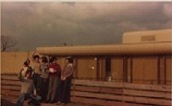
1974 - First refugees on
their way from
London to Glasgow
|
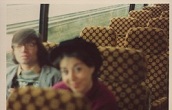
1974 -On the coach from
London to Glasgow
and Edinburgh.
|
What is the aim of my story
The plan is to continue to recreate my story this time in Scotland where I arrived with other Chileans as a refugee in November of 1974.
I always thought it was very important to tell our story which is my story. What type of refugees were we? I always thought that we were political refugees escaping from our country ruled by Augusto Pinochet, a fascist and bloody military dictator who managed to be in power for seventeen long and painful years. A man capable, under his orders, of carrying out the most horrendous crimes against humanity in the history of Chile.
Most of those who came to the UK as refugees were political people who belong or they said belonged to left-wings parties. In our democratic tradtions coming from respected left-wing parties always respecful of our laws and democracy. Other people like me, were just workers of all kind who supported the socialist government of Salvador Allende and his socialists policies.
The aim of my work, therefore,is to describe on this medium my story ( Notice that some people tells theirs stories in books) I suspect that my story is embedded in the history of the Chileans refugees in Scotland.
Why I left Chile for Peru.
At the end of 1973 Yolanda Huapaya Correa, a wonderful Peruvian lady I knew very well, wanted to help me after learning in Lima all about what was taken place in Chile under Pinochet. Sra. Yolanda decided to invite me to stay in Lima. After painful discusions with my old mother I decided to leave. Once I took the decision, Sra Yolanda sent me a Braniff International ticket and before departing for England on Sept of 1974, I spent nine very complicated months in the fascinating Peruvian capital in the company of the lovely Huapaya family whose solidarity was so important to me.
below: my plane ticket to travel from Santiago to Lima thanks to the generosity of Sra Yolanda Huapaya
.jpg)
Sra Yolada Huapaya (QEPD)
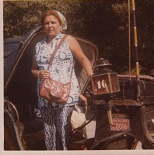
Everything in Lima was lovely for the first three months. I had a visa and the Huapaya family was extremely kind to me. During this period very bad news began to arrive from Chile about the atrocities being committed by the Pinochet regime and I become extremely worried. Needless to say, when I left Chile I was already very worried about the things that were taking place in our country. In my barrio, for example, we knew that some of our friends had already gone missing – meaning that we knew they had been detained, but without knowing their whereabouts and the reasons behind their detention. At the time none of us could work out why they were being held.
Soon, it was not only bad news that began to arrive from our country but, shortly my arrival, Peru was flooded with Chileans, many of whom had fled in fear of their lives. I began to meet many of our compatriots here, each of them with a sad story to tell about themselves, a relative, a friend or a friend of a friend.
Lima with some chileans friends, Below with my pal Fernando near lima
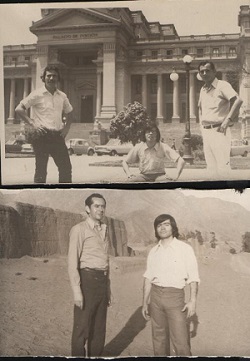
From a distance, the situation in our country seemed even more dramatic. For example, in Lima I had the opportunity to meet Mario Grez who had fled Chile hidden in the undercarriage of an aeroplane. His case was, of course, all over the Peruvian press and the subject of a documentary film called 'Un Salto al Vacío'-2007 by Pablo Lavin who had done many documentaries for Channel 4. (See up on the tab-left for the film)
In June 1974 Mario Grez Rivas, a young worker, escaped military controls at the local airport and fled from Chile, tied with a belt to the landing gear of a Boeing 707 headed to Lima. After enduring extreme temperatures, he arrived in critical conditions to the Peruvian capital, where he still had to face the attempts of the military authorities to bring him back to his country. Un Salto al Vacío approaches the events from three standpoints: the recreation of facts, the reflection of Alberto Zeiss –the actor who does a research to play the lead character–, and the current testimony of Grez himself who ended up living as a refugee in England.
Most Chileans were very well received by the Peruvian people, considering that we were supposed to be “revolutionaries” and that our country had been, in the 19th century, an enemy of Peru. Those who arrived from Chile said that they belonged to different left-wing political parties and were a rich mixture of people with different social backgrounds. My social-political background was confined to doing more or less what Allende asked us to do as workers - to support his social policies through the ballot box.
We came to London , and were received here by nice people from the Chilean Working Group who were receving Chileans refugees in a Hotel at 23 Princes Square, London W2. ( with a writen note on my first British Certificate of Regiration: occ. Student, c/o British Council
Our first British document
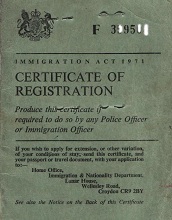
How and when the committees in Scotland came about to received us from London and who were the people involved in it, it is something I do not know. What I do know, however, is that Chilean solidarity committees were formed in Scotland and the UK soon after the coup of the 11th of September of 1973. The people involved in these committees were the ones who decided to help us in the UK, and not only this, but give support to a great campaign of solidarity against the Pinochet's regime
We know that the people involved in the formation of the solidarity movement with Chile in Scottish cities, were organizations and people from all walks of life: Trades unionists, people on the left of the Labour Party, MPs, members of the Scottish Communist Party, as well as member of the Socialists and Trotskyites Parties. And of course, students, workers, teachers, academics, Human Rights organizations, Amnesty international and Religious concerns were all united to help Chile in time of need and to help us the Chileans refugees in Scotland and in the UK as a whole.
The Chileans communities themselves in Scotland organised in different groups: Cultural and political groups in order to work together with the different solidarity groups in Scotland and the UK.
My British Airways tickets from Lima to London showing my status of Chilean refugee. B.A., did very good bussiness bringing us to the UK from Peru. Tickets were paid by the United Nations High Commissioners for Refugees. (UNHCR)
 - Copy.jpg)
London (20th of Septembre 1974)
After our arrival at our London hotel, some more Chileans began to arrive. We spent a few weeks in London and during this period everything was very exciting. We were in London! However, it was for us a rather disappointing city when it comes to night life as, by 11pm; everyone seemed to be retreating to their home for the night. “Buenos Aires was a living city 24 hours a day” I was told by those exiles coming to London from Argentina.
The Joint Working Group, however, which has among its members a Scotsman, decided that about 35 of us should go to live in Scotland because: it was important to vacate the London accommodation for other Chileans and because “Scotland was already prepared to receive Chilean refugees.” In fact, several Chile Solidarity Committees were already formed and ready to receive us with open arms in Glasgow, Edinburgh, Dundee, Stirling, Falkirk and other areas of Scotland. We know from Philip O’Brien (Phil was a Senior Lecturer and Sociology at the University of Glasgow, previously at the Institute of Latin American Studies.) that soon after the coup a Committee for Solidarity for Chile was formed at the Glasgow University and “made contact with the Glasgow Trades Council, the STUC, Jimmy Milne was in charge and he was first class in his assistance and took a very active role in setting up a wider solidarity”.
Gordon Hutchison, a very nice Scot, had seen me enthusiastically singing and playing the guitar at the London hotel and he mentioned to me that I was one of those people who would be travelling to Scotland and that, as far as he was concerned, I was going to be very happy there and he also said: “incidentally, the Scots love music, so you will be well received in that respect also”. (“Gracias”, Gordon, you were absolutely right)
Soon after my arrival in Glasgow I formed a Chilean Folk Group with two other Chileans refugees to do solidarity work. Soon we were called to duty. We were the First folk Group in Britain.
Release of Carmen Castillo
On the 15th of October, 1974, the Morning Star reported a picket of about 70 people at the Chilean Embassy in London demanding the release of Carmen Castillo and protesting at the murder of Miguel Henríquez, the MIR’s leader.
"The Chile Solidarity Campaign secretary Mike Gatehouse handed in a letter protesting at the cowardly detention of a woman in an advanced state of pregnancy and demanding Carmen Castillo’s immediate release”.
Carmen Castillo was eventually released in 1975 and our folk group (Tulio, Hugo and I) was invited to play in a big demonstration against the Junta in Liverpool as part of a programme at which Carmen had been invited to speak. We played at the top of the platform. ( on the right)
.JPG)
Our first experiences in Scotland
On the early morning of the 9th of October, 1974, we left London by coach. On the bus there were all kinds of people including several married couple and a mother with her daughter. As in the airplane from Lima to London, many of us had apprehensions:
We did not know much about Scotland, not much about Glasgow or Edinburgh. We knew nothing about the Scottish climate or its people. We knew nothing where we were going to live or the people we were to meet and if they spoke our language.
We arrived the same day in Glasgow. About 6 or 7 Chileans continued their journey towards Edinburgh. The people of these cities were ready to offer us their love and solidarity and, for our part, we were ready to reciprocate them with our own affections. This was the first big group of exiles to arrive in Scotland. Once in Glasgow, the bus headed towards the West End of the city to the home of Mike and Karen Gonzalez and their two small children: Anne and Dominic. The home of the Gonzalez was a large flat situated in a street very close to the campus of Glasgow University. They were exceptionally helpful to us and both spoke Spanish.
The first glimpses of Glasgow were from the bus on our journey to Mike and Karen’s home. Mike was lecturer in Spanish at the same university. My first impressions of the city were positive and, I suppose, all for the wrong reasons. On the bus it seemed to me that I was looking at a rather poor city, a run-down place with drunken people on the streets. These first glimpses of Glasgow were made more dramatic by the fact that, when we arrived, it was already dark and raining heavily. In Britain it was autumn and in Chile it was springtime. I said to myself, what a contrast! In many respects, Glasgow was not London but, even so, everything that I saw from the bus’s window seemed to me different. However, I said to myself: “I feel at home here” and indeed, Glasgow became my home for the next four years.
A number of us went to live in the West End of the city. I lived at no. 30 Kersland St. in a beautiful flat . Suzi Weissman, an American girl from Montana, offered me accommodation and I was very happy here. Suzi was a very kind person, spoke Spanish, and was one of a number of volunteers who offered accommodation to some of the refugees. I remember that in our flat there was a lovely "piano de cola". After I arrived at Suzi flat, I moved to Drumchapel, where a number of Chileans went to live in corporation houses. Roberto Naduris, a nice and gentle refugee, came to stay with Suzi and subsequently both felt in love got marry in Glasgow and moved to the US. Roberto died in that country. A big pal of Roberto was another gentle Chilean: ‘el Flaco’ Antonio Valenzuela who went to marry a French girl. They moved to France and Antonio died in that country. Tito Alvarez originally from Chiloe died in Glasgow and another Chilean returned to Chile in 2004 to become, after a few years, head of ENAP, a highly paid executive top post in the Chilean oil industry.
Canadian Jacqueline Roddick was one of many people in Glasgow who worked tireless with the Chileans refugees since our arrival.. Unfortunately, Jackie also died a few years ago.
The experience of exile was sad and very hard. After the coup about one million Chileans left the country and ended up in many part of world. About 3000 of them ended up in Britain of whom about 500 came to live in Scotland during the 1970s and 1980s. You may explore our experience by looking at the "Chilean Refugees" - above on the left.
Little is known in Chile of the exiles and what is known is what the Pinochet's regime and its supporters have said about us."Refugees had had a wonderful life" - This is far from the truth and all was part of the propaganda war against us, Allende's supporters, by the Pinochet's dictatorship.
One of the main problem for any refugee was to learn a new language. In our case, we had to learn English and try to live and integrate in a society that was very different from ours. When we arrived we were full of uncertainties and worries. Families have to see the welfare of their children, medical care and many other issues. I could see the disintegrations of several families among the exile community.
On top, we have to worry about those left behind: our families, our friends, our comrades all submerged in a bloody dictatorship. Some Chileans came to Scotland direct from prisons.
Most of us, however, who came to live in Scotland were well received by the Chilean Solidarity Campaign and the people of Scotland. See below and the adoption of Chilean prisoners.
Cumbernauld and Kilsyth Chile Solidarity Campaign
Solidarity with the people of Chile in Scotland was vast and those who were providing this solidarity with Chile were not only very busy organising quality events and finding the right people as participants but also we can see that they faced financial difficulties. The following was the: Autumn Cumbernauld and Kilsyth Chile Solidarity Campaign newsletter for 1976. ( notice at the end of the programme, the activity mentioned with Coca Rudolphy)
Meetings Campaign meetings are to be held in the Sprouse Road Community rooms,
Abronhill, 8.00pm on the following dates:
Monday 6th September Organisation of Sept/Oct events
Monday 4th October Annual General Meeting
Monday 1st November outside speaker
Monday 6th December Legal position on Human Rights
Prisoner Adoptions. A total of thirteen Chilean political prisoners have been adopted
in our area. The adopting groups are the Carbrain, Kildrum and
Seafar ward Labour parties, The Banton and Queenzieburn branch
LP Cumbernauld Concern, The east Dunbartonshire Liberal
Association, a local branch of the EIS, and the two Cumbernauld
AEU branches. So far five of the prisoners have been released and
effective contact has been established with one of the others.
September Events. To mark the third “anniversary” of the fascist Coup the Scottish
Chile Defence Committee have organised the following:
DEMONSTRATION Saturday 11th of September.
Assemble Blythwood Square at
11am. March to Custom house Quay:
Madame Allende, Judith Hart MP, Alex Ferry and Chilean Folk
Group(this group is me, Tulio Bravo, and Hugo Alvarez)
Sunday 12th September
Citizens Theatre, Glasgow 7pm.
Stalls and circle £1.25, balcony 65p
The Laggan, 7:84 theatre Group, Phil McColl, Matt McGin and
The Chilean Folk Group are amongst the performers.
(The above Chilean group mentioned is me, Tulio Bravo,
and Hugo Alvarez)
CHILEAN PLAY - called Chile 1973 starring Coca Rudolphy at the Edinburgh
Festival Fringe, August 30-Sept.10th, Crown Theatre, Hill
Place, Edinburgh, 5pm.
Pleasae contact me as soon as possible regarding transport.
Arrangements for any of these events, final arrangements will
be made at the meeting on September 6th.
|


